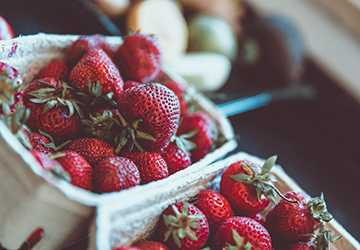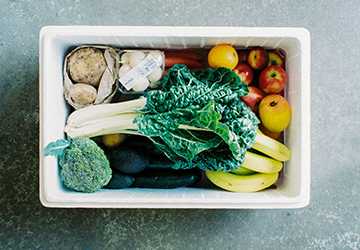What You Should Know About Organic Food
As preferences shift towards a diet that brings greater health and responsibility to our planet, the Organic Food Guide proves to be an important moment for those who want to understand the nuances between organic foods and conventional foods. Organic food includes products grown, processed, and curated without the use of synthetic fertilizers, pesticides, or genetically modified organisms (GMOs).

What Makes a Food Organic: The Exact Protocol
To earn the moniker "organic," food must meet strict requirements. Although these guidelines vary slightly by country, they generally require the following:
● The use of synthetic fertilizers or pesticides is expressly prohibited.
● Use regenerative agriculture strategies such as crop rotation, green manure, compost and biological pest control.
● Ensure that the animals on organic estates eat organic feed, have free access to the outdoors, and are not exposed to antibiotics or hormonal interventions.
"Exploring What Makes Food Organic" explains why certain items are certified organic and receive higher ratings than non-organic items.
Benefits of Organic Food: Motivations for Choosing Organic Food
The benefits of organic foods are wide-ranging: they impact personal health, promote environmental protection, and support the vitality of local economies. Here are a few compelling reasons to choose organic:
● Reduced exposure to pollutants: When you choose organic foods, your exposure to harmful pesticides and chemicals is significantly reduced.
● Organic Conservation: Organic farming practices are carefully designed to mitigate pollution and protect the integrity of water and soil.
● Strengthen local communities: Purchasing organic food supports local farmers and businesses with a solid commitment to sustainable and ethical practices.
Organic food guide: Tips for coping with change
Adopting an organic lifestyle can be a challenge that can be met. This organic food guide recommends a step-by-step approach, such as replacing basic staples with organic foods. Here are strategies for a smooth transition:
● Prioritize purchasing organic alternatives to produce known to be high in pesticide residues, such as apples, strawberries and leafy greens.
● Visit a local produce market for fresh, seasonal, certified organic produce.
● Be familiar with the "Clean Fifteen" - a catalogue of products least susceptible to pesticide contamination.
Understanding the complexities of organic certification
The path to organic certification is an arduous journey, and food must meet strict organic growth and processing standards. This presentation highlights the complex challenges and intricacies of obtaining and maintaining organic certification and the substantial commitment farmers and producers require to comply with these standards. Organic certification is more than just a designation; it symbolizes a commitment to promoting environmental well-being and protecting consumer health.
● Universality and diversity of standards: Examine the diversity of organic certification standards worldwide while recognizing their shared goal of promoting environmentally friendly practices.
● Certification Odyssey: Details the process steps and assessments necessary for organic product certification, emphasizing rigorous oversight and a commitment to ethical transparency and environmental stewardship.

Organic existence: Beyond dietary habits
Integrating organic principles into the fabric of everyday life
Adopting an organic lifestyle transcends dietary preferences and embodies a combined health and environmental responsibility ethos. This section explores strategies for integrating organic principles into everyday life, from clothing and personal care products to gardening and home hygiene.
● Organic Self-Care Products: This section highlights the need to choose organic products for skin care and beauty care to reduce exposure to harmful substances. Reduce chemicals.
● Creating an Organic Habitat: Guides establishing an organic habitat, incorporating organic gardening practices and eco-friendly cleaning products.
Promote the socio-economic benefits of organic food
Choosing organic products extends its positive impact beyond personal and environmental well-being to social and economic realms. This article explores how promoting the organic industry can help local economies thrive and maintain ethical labour standards.
● Economic empowerment through organic: This section discusses the impact of purchasing organic products on empowering local farmers and small businesses, promoting community prosperity and cohesion.
● Ethical work in organic farming: This paper explores how organic certification is crucial in promoting fair labour practices and the dignified treatment of workers in the agricultural sector.
Organic vision: Innovation and future vision
Innovation and evolution of organic agriculture
As the demand for organic products increases, so does innovation in organic farming methods and products. This section provides an overview of the prospects of organic agriculture and highlights emerging trends and technological breakthroughs that promise to improve sustainability and operational efficiency.
● Technological Advances in Organic Gardening: This chapter explores avant-garde technologies and practices, from precision farming to biodynamic methods, that are revolutionizing organic agriculture's productivity and environmental friendliness.
● The expansion of non-edible organic products: Examining emerging markets such as organic textiles and cleaning supplies illustrates the overall expansion of the organic spirit.
Promoting organic philosophy: advocacy and inspiration
The maintenance and growth of organic philosophy depend on vigorous advocacy and educational efforts to expand awareness and encourage wider acceptance of organic practices. The final section highlights the importance of community engagement and education in promoting the benefits of an organic lifestyle.
● Community-Focused Organic Efforts: Celebrating the success of community initiatives aimed at expanding access to organic food and raising public awareness of its benefits.
● Educate consumers: The organization works to provide laypeople with a clear understanding of organic standards and certifications, allowing them to make informed decisions that are consistent with their ethical beliefs and contribute to the planet's well-being.
Diploma
In summary, the path to more incredible energy requires conscious nutritional decisions. By exploring the benefits of going organic, discovering why food goes organic, and using the detailed guide, you can make choices that improve your health and promote a more sustainable and equitable food ecosystem. By incorporating more organic products into your cooking, you will enjoy their richer flavour and nutritional value and contribute to a more sustainable and equitable food web.







